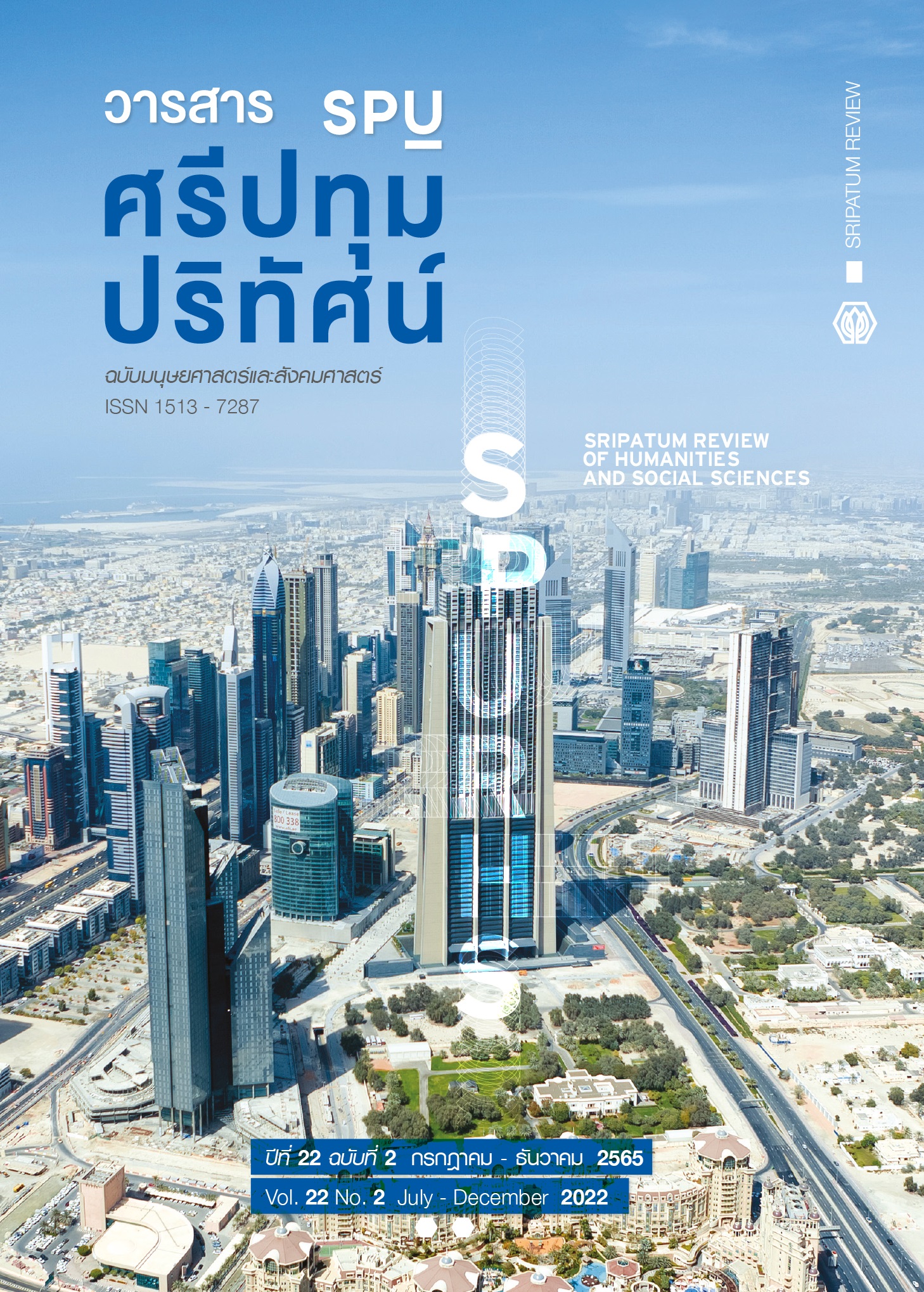Learning Experiences for Children through Family Tourism Activities: The Exploratory factor analysis and Relationship
Main Article Content
Abstract
This article aimed to study the characteristics of learning experiences for children and types of family tourism activities and to explore the relationship of family tourism activities that link to the learning experiences for children. The questionnaires were used to collect data from the samples of 220 parents with 6-12 years old children. Exploratory factor analysis was a technique to examine children learning experiences on travel and type of family tourism activities.Then, chi-square was used to explain the relationship between family tourism activities and learning experiences for children. The results revealed that characteristics of children’s learning experiences from family tourism consisted of Exploration, Promoting Child Development, Gaining New Skills, and Engagement. In addition, types of family tourism activities included: Cultural Activities, Soft Adventure Activities, Leisure Activities, Learning Activities, and Purposive Activities. Moreover, these activities also offered different learning experiences for children. The results from this study can be used as a guideline for designing tourism activities that provide suitable learning experiences for children to accommodate family tourists.
Article Details

This work is licensed under a Creative Commons Attribution-NonCommercial-NoDerivatives 4.0 International License.
1. กองบรรณาธิการสงวนสิทธิ์ในการพิจารณาและตัดสินการตีพิมพ์บทความในวารสาร
2. บทความทุกเรื่องจะได้รับการตรวจสอบทางวิชาการโดยผู้ทรงคุณวุฒิ แต่ข้อความและเนื้อหาในบทความที่ตีพิมพ์เป็นความรับผิดชอบของผู้เขียนแต่เพียงผู้เดียว มิใช่ความคิดเห็นและความรับผิดชอบของมหาวิทยาลัยศรีปทุม
3. การคัดลอกอ้างอิงต้องดำเนินการตามการปฏิบัติในหมู่นักวิชาการโดยทั่วไป และสอดคล้องกับกฎหมายที่เกี่ยวข้อง
References
Bandura, A. (1996). Ontological and epistemological terrains revisited. Journal of Behavior Therapy and Experimental Psychiatry, 27(4), 323-345.
Byrnes, D. A. (2001). Travel schooling: Helping Children Learn through Travel. Childhood Education, 77(6), 345-350.
Carr, N. (2011). Children's and Families' Holiday Experience. London: Taylor and Francis.
Cochran, W.G. (1977). Sampling Techniques. 3rd ed. New York: John Wiley and Sons.
Cullingford, C. (1995). Children's Attitudes to Holidays Overseas. Tourism Management, 16(2), 121-127.
Curtale, R. (2018). Analyzing children’s impact on parents’ tourist choices. Young Consumers, 19(2), 172-184.
Daly, K. (2004). The Changing Culture of Parenting. Ottawa: Vanier Institute of the Family.
Feuer, A. (2009). School's Out for the Summer: A Cross-Cultural Comparison of Second Language Learning in Informal Settings. International Journal of Bilingual Education and Bilingualism, 12(6), 651-665.
Freysinger, V.J. (1994). Leisure with Children and Parental Satisfaction: Further Evidence of a Sex Difference in the Experience of Adult Roles and Leisure. Journal of Leisure Research, 26(3), 212-226.
Gram, M. (2005). Family holidays. A qualitative analysis of family holiday experiences. Scandinavian Journal of Hospitality and Tourism, 5(1), 2-22.
Hair, J. F., Anderson, R. E., Babin, B. J., and Black, W. C. (2010). Multivariate Data Analysis: A Global Perspective. Upper Saddle River, NJ: Pearson.
Ingkadijaya, R. (2018). Family Tourist-is Different Motive, Different Choice of Tourist Activity?. E-Journal of Tourism, 5(2), 72-84.
Inskeep, E. (1991). Tourism Planning: An Integrated and Sustainable Development Approach. New York: Van Nostrand Reinhold.
Jirojanaku, P. (2009). Concepts, theories on health promotion and their application. 2nd ed. Bangkok: Praboromarajchanok Institute. (in Thai)
Johns, N., and Gyimóthy, S. (2002). Mythologies of a Theme Park: An Icon of Modern Family Life. Journal of Vacation Marketing, 8(4), 320-331.
Johns, N., and Gyimóthy, S. (2003). Postmodern Family Tourism at Legoland. Scandinavian Journal of Hospitality and Tourism, 3(1), 3-23.
Macintyre, C. (2002). Play for Children with Special Needs: Including Children Aged 3-8. Great Britain: David Fulton Publishers Ltd.
Nickerson, N. P., and Jurowski, C. (2001). The influence of children on vacation travel patterns. Journal of vacation marketing, 7(1), 19-30.
Obrador, P. (2012). The Place of the Family in Tourism Research: Domesticity and Thick Sociality by the Pool. Annals of Tourism Research, 39(1), 401-420.
Puan, C. L., and Zakaria, M. (2007). Perception of Visitors Towards the Role of Zoos: A Malaysian Perspective. International Zoo Yearbook, 41(1), 226-232.
Ritchie, B. W., Carr, N., and Cooper, C. (2008). School Excursion Tourism and Attraction Management in Fyall, A., Garrod, B., Leask, A., and Wanhill, S. (eds), Managing visitor Attractions. Oxford: Elsvier.
Sojasi, Q., Hamdollah, Shayan, H., Solimani, Z., and Ghorooneh, D. (2021). Aphenomenological study of the learning experience of children in rural tourism destinations. Tourist Studies, 21(2), 235-259.
Schänzel, H. A., Yeoman, I., and Backer, E. (2012). Family tourism: Multidisciplinary perspectives. Bristol: Channel View Publications.
Schänzel, H. A., Smith, K. A., and Weaver, A. (2005). Family Holidays: A Research Review and Application to New Zealand. Annals of Leisure Research, 8(2-3), 105-123.
Schänzel, H. A., and Yeoman, I. (2015). Trends in Family Tourism. Journal of Tourism Futures, 1(2), 141-147.
Shaw, S. M. (2008). Family Leisure and Changing Ideologies of Parenthood. Sociology compass, 2(2), 688-703.
Shaw, S. M., and Dawson, D. (2001). Purposive leisure: Examining parental discourses on family activities. Leisure sciences, 23(4), 217-231.
Small, J. (2008). The Absence of Childhood in Tourism Studies. Annals of Tourism Research, 35(3), 772-789.
Taylor, A. F., Wiley, A., Kuo, F. E., and Sullivan, W. C. (1998). Growing Up in the Inner City: Green Spaces as Places to Grow. Environment and Behavior, 30(1), 3-27.
The Guardian. (2014). Holiday Costs: Terms-Time versus school Holidays. [Online]. Retrieved November 2, 2021 from: http://www.theguardian.com/travel/2014/feb/04/taking-kids-out-of-school-before-end-of-term.
TripAdvisor. (2014). Family Travel Survey. [Online]. Retrieved October 20, 2021, from: http:// www.multivu.com/mnr/70425519-tripadvisor-survey-family-travel-on-the-rise-in-2014.
Turley, S. K. (2001). Children and the demand for recreational experiences: The case of zoos. Leisure Studies, 20(1), 1-18.
Wiratchai, N. (2005). LISREL Modeling Statistics analysis for Research. 3rd ed. Bangkok: Chularongkorn Publishing. (in Thai)
Wu, M.-Y., Wall, G., Zu, Y., and Ying, T. (2019). Chinese children's family tourism experiences. Tourism Management Perspectives, 29, 166-175.


